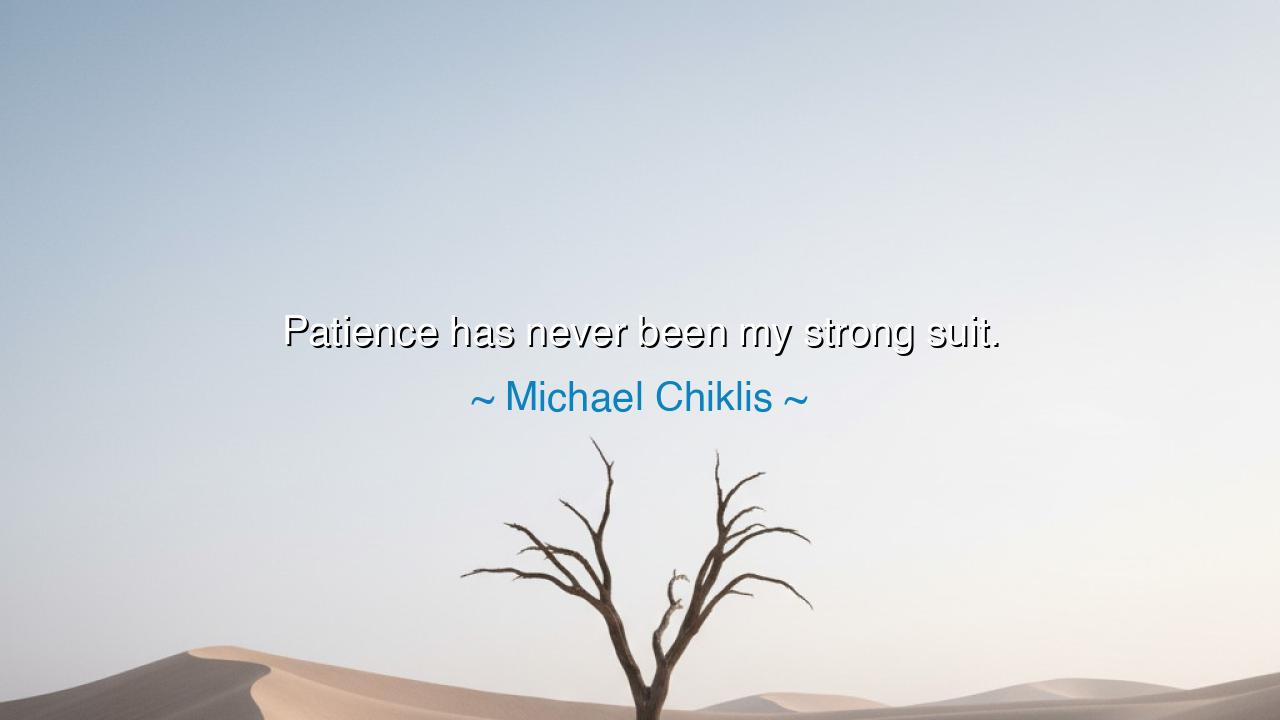
Patience has never been my strong suit.






Hear the candid confession of Michael Chiklis: “Patience has never been my strong suit.” At first, these words may sound like a humble admission of personal weakness, yet within them lies a truth that touches every restless soul. For the battle between impatience and endurance has raged in the hearts of men and women since the dawn of time. The yearning to leap forward, to force the moment, to see results before their season—this is a fire that burns in many, and it is one of the oldest struggles of humanity.
Patience is no easy virtue. It does not shout, nor dazzle, nor gratify quickly. It is the quiet strength, the discipline of waiting, the art of trusting the slow work of time. To admit, as Chiklis does, that patience does not come easily, is to acknowledge that one wrestles with the desire for immediacy—a desire familiar to all who have ever hungered for success, justice, or fulfillment. His words remind us that the path to virtue often begins in recognizing our own shortcomings.
Consider the tale of Alexander the Great. Brilliant, fearless, and insatiably ambitious, he swept across the known world before the age of thirty. Yet for all his victories, it was his lack of patience that sowed the seeds of division. He sought to expand endlessly, without pausing to consolidate what he had won. The result was an empire too vast, too fractured, to endure after his death. His greatness was undeniable, but so was his flaw: impatience. Thus history teaches us that even the mightiest can falter when the discipline of waiting is absent.
By contrast, think of Mahatma Gandhi, who faced the oppression of empire not with hurried rage, but with the slow, steady march of nonviolent resistance. For decades he bore insult, imprisonment, and struggle, yet his patience became the weapon that toppled a mighty empire without sword or cannon. Where impatience seeks swift results and often burns itself out, patience gathers strength over time, becoming unshakable, irresistible.
Chiklis’s admission, then, is more than personal. It is a mirror held up to us all. Who among us does not feel the weight of waiting, the frustration of delay? We live in an age that tempts us with immediacy—instant answers, instant pleasures, instant judgments. To confess that patience is not easy is to speak honestly of a universal trial. Yet to name this struggle is also to begin to master it.
The lesson for us is clear: though impatience may drive us to act boldly, it must be tempered by patience if we are to endure. A fire untended consumes itself; but a slow, steady flame can warm a house for a lifetime. To lack patience is not a curse, but a challenge—a call to cultivate what does not come naturally. As Chiklis admits his struggle, so we too must admit our own, and in admitting, seek to grow.
Practical wisdom lies before you: Practice small acts of patience each day. When tempted to rush, pause. When angered by delay, breathe deeply. When striving for success, remember that lasting achievements are not born in a moment but through persistence over years. Read the lives of those who endured, and let their examples strengthen you. In time, what was once your weakness may become your strength.
So let these words echo in your heart: “Patience has never been my strong suit.” If you find yourself in the same confession, do not despair. For to recognize one’s weakness is the first step to virtue, and to wrestle with impatience is to walk the ancient road of all who sought greatness. May you, through discipline and endurance, learn to master the art of waiting, and in so doing, discover a strength far deeper than haste could ever give.






AAdministratorAdministrator
Welcome, honored guests. Please leave a comment, we will respond soon